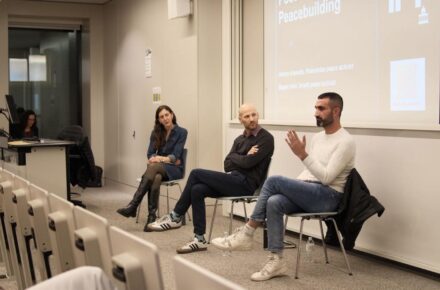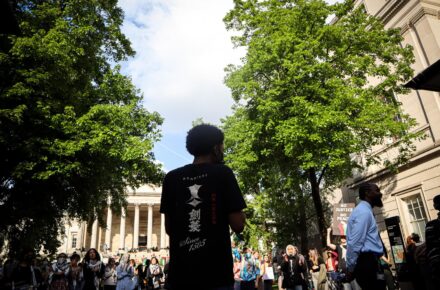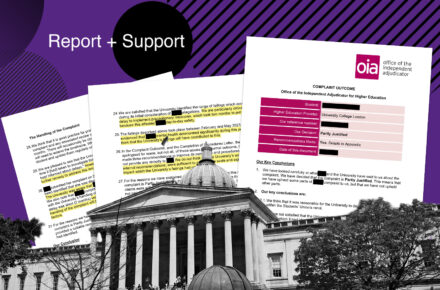Anna Maria Papaoikonomou & Neil Majithia
If you’ve ever had to change your modules, inquire about extenuating circumstances, or even been through the enrolment process at UCL, you’ve likely realised that the university is far from efficient when it comes to admin. However, the experience of one UCL student in particular highlights just how debilitating poor communication can be.
Nnamdi, a Slavonic and East European Studies (SSEES) student at UCL, has been appallingly let down by admin and support services throughout his years at the university. In September 2019, Nnamdi was enrolled as a first-year undergraduate after participating in Access UCL. This is defined by the university as ‘a contextual offer scheme for applicants from groups that are underrepresented at UCL’, meaning Nnamdi’s personal circumstances were taken into account by the university when he was accepted to study there.
However, Access UCL release their exam results a week after A-Levels, which meant that Nnamdi was not guaranteed first-year accommodation. Finding accommodation was a struggle for students across the UK at the time. Due to increased demand for both hygiene and social distancing, UCL was required to allocate students en-suite bedrooms. Moreover, universities across the country were still getting to grips with the limitations placed on gatherings above six people: a rule which made assigning rooms to students logistically challenging.
In an interview with The Cheese Grater, Nnamdi explained that because he was accepted on the basis of a contextual offer, he did not attain a room in halls, and resorted to finding private accommodation. Situated in Wembley, Nnamdi was tasked with a long commute in order to socialise. Costly and isolating, this was far from ideal. However, Nnamdi was not struggling alone. For all students at UCL, and across the country, the year to come was far from the university experience they’d once dreamed of.
The UK Parliament website notes that in the months following September 2019 ‘living arrangements were restricted due to providers following Government guidance on Covid management. Furthermore, outbreaks of Covid-19 in a number of universities put many students in self-isolation and caused unexpected difficulties.’ Throughout Nnamdi’s first term, all SSEES lectures, seminars, and tutorials were online, with all students vulnerable to loneliness in such an isolating climate.
By Spring 2020, further lockdowns for Covid were mandated by the government. Nnamdi explained to The Cheese Grater how all SSEES students were “given a basic pass mark, which kind of diminished the value of some of the work [he’d] done.” However, despite his initial difficulties with accommodation, Nnamdi told The Cheese Grater: “I’d managed to get a 78 in one assignment, a 72 in another, and I was at the level of a First for everything.”
Despite his academic excellence, from his second term onwards, Nnamdi would not return to campus for the remainder of his first-year at UCL. For the 2020-21 exam season, UCL introduced a “no-detriment” package. These measures meant that assessments were adapted to accommodate for online learning; depending on the department, students were provided with open-book assessments, take-home papers, or extra time. However, SSEES students like Nnamdi were provided with a pass grade by their department, and were not required to continue with assessed work. Like all students, and indeed everyone during the Covid-19 Pandemic, Nnamdi felt deeply isolated.
Nnamdi was not only battling the inevitable mental toll of a global pandemic, but he was also dealing with a family bereavement. In a sincere interview with The Cheese Grater, Nnamdi told us: “My mental health took a turn in January, and at the time I also lost a relative to a mental health condition. The isolation that came from lockdown wasn’t helping, and it was a really bleak time for me.”
Following this series of events, Nnamdi made the decision to put in an Extenuating Circumstances (EC) form. UCL defines an EC as such: “events which are sudden, unexpected, significantly disruptive and beyond your control and which may affect your performance at summative assessment, such as a serious illness or the death of a close relative.”
When asked if Nnamdi was comfortable explaining why he decided to apply for EC, he told us it was so “[he] could get extensions on some stuff [he] could not pull myself together to do, and [he] also went to doctors, getting medication for depression and anxiety.” The provisions which a successful EC application gave Nnamdi meant that he was able to take ‘6 weeks at home to have people around me again.’ However, he explained to The Cheese Grater how his mental health was still extremely poor, remembering how his “partner was doing 400 mile bus journeys to make sure he was okay.”
After six weeks at home throughout the winter of 2021, Nnamdi returned to halls in London. However, though he attempted to catch-up with pre-recorded lectures, Nnamdi had still missed out on six weeks of teaching, and so found himself behind on essential aspects of his degree. Throughout, Nnamdi was unable to find the resources which would allow him to get back on track with his studies. Despite contacting UCL admin, they failed to successfully communicate the information which Nnamdi required. It was at this point when Dr Christian Emery, the department admin for SSEES, attempted to help Nnamdi, and suggested that he may need to apply for long-term EC.
It was only when Nnamdi’s mental health became considerably harder to deal with that he decided to consider this option. With lockdown measures still enforced, the academic and financial pressures which Nnamdi was facing at the time became too much. He told The Cheese Grater, “In March, I attempted to take my life, about four times in the space of two weeks. I ended up having to go to the hospital for an overnight stay, change medication. But still a week later I had a panic attack that was so bad I couldn’t breathe, and had to go to hospital again.”
In his third term of second year, Nnamdi applied to take Late Summer Assessments (LSAs), and was also advised by his doctor to withdraw from his year abroad. After submitting the necessary evidence, Nnamdi received an email from UCL admin which stated: ‘Your LSAs won’t be capped when you come back. You’ll be able to do them properly, you’ll have support and you’ll be notified about everything.’ Grateful for this outcome, Nnamdi felt encouraged by the initial aid provided by UCL.
In order to receive the support he required for his mental health, Nnamdi applied for a deferral year following his decision to take LSA’s. This meant that any teaching or examinations would be pushed back a year, in which Nnamdi would be able to engage in the treatment he required. Throughout a deferral year, an individual is still registered as a university student, and Nnamdi was also able to access student finance support, which alleviated a small fraction of his financial issues.
However, though UCL may have provided Nnamdi with a much needed deferral year, they failed to effectively inform Nnamdi throughout this period. In his interview with The Cheese Grater, Nnamdi reflected on the shortcomings of UCL admin: “Around October time, I was apparently meant to get my re-enrolment email. I didn’t know about this, and apparently neither did UCL. There were no emails to either my personal or university email. I was working a job at the time, I had to pay bills – I didn’t have time to chase this up even if I had known about it.”
Following on from this silence from UCL, Nnamdi had no communication from the university until April 2022, when he got an email from a member of UCL admin that he’d never interacted with before. Nnamdi relayed this email to The Cheese Grater, which essentially told him that “these are the assignments you’re meant to do this summer. You have one in a week. Then one the week after that.” For Nnamdi, who explained how he was ‘nowhere near ready’, this came entirely out of the blue. At this point, he was “working full time […] and hadn’t been given any notice about when I should expect my assignments to be. I didn’t have the time to catch up on the large swathes of work I missed out on last year.” Despite this, Nnamdi managed to complete both of his assignments, whilst continuing to work full time.
After completing these examinations in Spring of 2022, during his deferral year, Nnamdi received an email from UCL on June 15th which told him that ‘because there has been no continuation of your degree, you’ve been awarded a certificate of higher education.’ Up till this point, Nnamdi was preparing to take his LSA’s in August 2022, he even quit his job on May 20th.
Outraged, Nnamdi told The Cheese Grater, “I had quit my job to work on prep for the LSAs, but suddenly I’m no longer a student?” As for his provisional results, Nnamdi received a 64 and a 37.25: a 2:1 and a fail. However, Nnamdi explained that “when August came and I got official grades, the second assignment’s mark was meant to be 66.” Nnamdi was full of questions, and confused as to why he received “a 10% lateness penalty despite an EC,” and why that brought the mark down to a 37.25. and why he couldn’t take his LSAs. Upon further investigation, the 37.25 was in fact unrelated to Nnamdi’s LSAs. The results of these exams were blocked because UCL admin was yet to enrol him. The admin team claimed he must have missed the email, but after countless searches, Nnamdi found nothing.
Despite managing to successfully enrol Nnamdi as a late candidate, Nnamdi was told an issue had arisen with the UCL system. Poor communication and inaccurate grading appears insignificant in comparison to this error, which resulted in Nnamdi being charged £6000 for sitting just two assignments. Just three days into Nnamdi’s LSA period, UCL admin assured him that there was no need to pay this bill, and he didn’t have to pay the amount in the end. As stated on the UCL website, there is ‘no additional tuition fee for a Late Summer Assessment, whether that be a Resit or a Deferral without Tuition.’ If he had been correctly enrolled, several ‘back and forth emails with IT and admin, asking ‘what’s going on? Why is this bill here? Why is this delaying my enrolment?’, which caused Nnamdi to ‘spiral’, could’ve been avoided.
Despite ample revision and preparation for these exams, Nnamdi told The Cheese Grater that he’d had ‘no guidance about what the exam would be like. When the time came, I had no idea where the question was. That exam was soul crushing to say the least. They just had to send me a quick email with information for these exams, or let me use the Moodle page. It would have made it so much more accessible.’ This only highlights the inability of UCL admin to effectively communicate, a skill which can make the world of difference to any student, especially one struggling with their mental health. Just one email, or even a set of guidelines sent in advance about the examinations, would’ve prevented much of Nnamdi’s stress.
Thankfully, not every LSA Nnamdi took was so ‘soul crushing.’ His Russian teacher booked hours out of her day to guide and support him following his year-long deferral. Yet, although Nnamdi may have been pleased with this exam, when his results came in, he soon realised UCL’s statement that he need not worry about his assessment marks being ‘capped’ at the 40% pass threshold was untrue. Due to filing for an EC prior to an LSA, a cap was placed on his Russian Politics and Society exam. However, Nnamdi told The Cheese Grater that ‘some of my others were then still capped’, despite the UCL website stating that ‘If you undertake a Deferral of your first attempt, your module marks will not be capped.’
In September, Nnamdi received the news that he failed the year by a mere 0.25%. “It’s such a kick in the teeth. And the report card had that 37.25 grade on it still, so that’s ultimately what failed me.” This led to another “email chain with admins, who [were] saying my original score was always 37.25. One admin realised the mistake, and I did get 66 […] But then another admin realises I always should have been capped at 40, and somehow the 37.25 makes sense.” This ongoing series of confusion over his grades was the last thing Nnamdi needed, but, he tells The Cheese Grater, “in the end they still let me back in for the next year on account of my top 90 credits.”
By September 2022, Nnamdi was due to begin his third year at UCL. Finally enrolled, and continuing his studies on the merit of his exams, Nnamdi placed a deposit and first month’s rent on a flat. He awaited his student finance. It didn’t arrive. Out of work, and struggling to pay for transport, food, and bills, Nnamdi accrued £4000 of debt. Only when Nnamdi went to UCL admin in person did he finally receive his student finance 15 days into term. During this 15 day window, Nnamdi’s student ID card didn’t work as UCL was still yet to unroll him, so he was unable to get into buildings to attend any lectures or seminars.
Nnmadi explained to The Cheese Grater why this error was made: ‘“Admin had made two registrations for me as a student – one where they accidentally graduated me, and another where I was still an active student. They hadn’t communicated with themselves when they tried to correct their mistakes, and the conflict in the system meant security couldn’t let me into UCL buildings.” Yet, just because Nnamdi wasn’t busy with classes, this didn’t mean he wasn’t preoccupied. He spent “four hours of [his] own time talking with admin and security.” Thrown into a situation which made him feel like an ‘imposter’, Nnamdi’s mental health declined once again. “Nothing was going my way, and so I relapsed. I attempted to take my life again.”
At the time of interview, Nnamdi has just put in a financial assistance form, and is waiting to hear back. Clearly, UCL doesn’t understand the implications of a delay in a loan payment. Nnamdi is still required to commute to and from campus in rush hour, a journey which costs him at least £10 everyday. Without student finance, he’ll soon be unable to continue with his studies.
UCL appears to be more concerned about their own reputation and liability than the mental wellbeing of their own students. Nnamdi revealed to The Cheese Grater that Student Support and Wellbeing flagged up his EC claim. “There’s some sort of safeguarding protocol, so they tried to make me use UCL well-being support. From my experience, they’re so limited in what they can do. They don’t want to be liable for someone suicidal.’
Nnamdi is right. If you take a look at the UCL guidelines for suicide support, you’re advised to call 999, as ‘UCL Student Support and Wellbeing (including Student Psychological and Counselling Services) are not able to provide any kind of emergency or crisis support.’ Though UCL may claim to champion student wellbeing, UCL’s Student Psychological and Counselling Services (SPCS) are not qualified to provide aid in a myriad of circumstances, for example if:
- You need treatment for addictions, eating disorders such as anorexia nervosa or bulimia, post-traumatic stress disorder (PTSD), or obsessive compulsive disorder (OCD)
- You need treatment for severe long-term mental health conditions like schizophrenia, bipolar disorder and personality disorders
- You need a diagnosis for Specific Learning Difficulties (SpLDs) like dyslexia, dyspraxia or Attention Deficit (Hyperactivity) Disorder (AD(H)D), or Autistic Spectrum Conditions (ASCs).
This is understandable; SPCS is only able to provide therapy and aid for a limited number of mental health conditions for which their staff are qualified. However, this does not mean that UCL can’t fund or subsidise third party support. Moreover, no student should ever be denied support in a crisis, and employing qualified members of staff for this distressing, yet inevitable eventuality is essential.
As for Nnamdi, he’s requesting just two things from UCL: an accurate amendment of his grades, and a formal apology. “I don’t want a private emailed apology,” Nnamdi states. He believes that “a public declaration that this has happened, and acknowledging similar instances where this occurred, is necessary. Setting out steps to make sure it doesn’t happen again. A promise that they’ll hold themselves to.”
It should never fall on a struggling student to have to use their own resources to get themselves back on their feet. Following his experience, Nnamdi summed up his advice for current UCL students to The Cheese Grater: “Ask yourself when you have a problem – am I actually going to get support from the university here? Or will I have to spend my personal time, my personal money, getting things resolved? Will I have the mental capacity to study on top of all that?”
Although admin is often perceived as taking a backseat, it’s essential to effective communication. Without this, students who are struggling are compelled to expend limited resources, be that money, time, or mental energy, on advocating for their own wellbeing. UCL’s lack of accountability and proactivity in regard to administrative services leaves students unable to escape a repetitive cycle in which they are constantly chasing answers. Effective administration certainly isn’t a quick fix to every problem, or for every student, but it’s a step in the right direction and one that needs to happen now.









